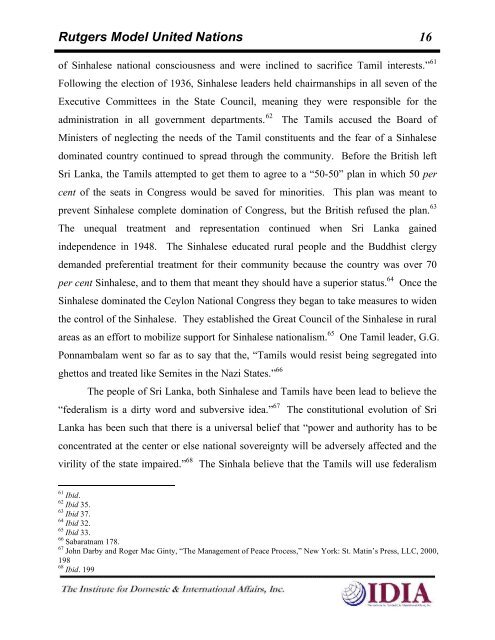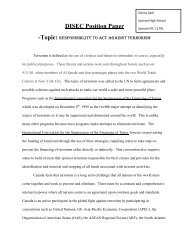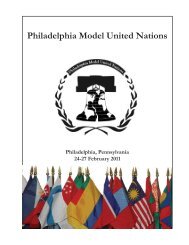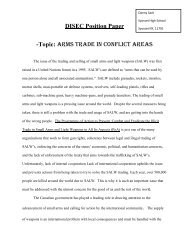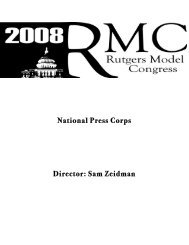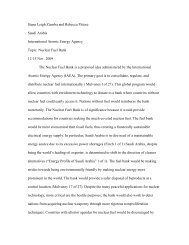Create successful ePaper yourself
Turn your PDF publications into a flip-book with our unique Google optimized e-Paper software.
<strong>Rutgers</strong> <strong>Model</strong> <strong>United</strong> <strong>Nations</strong> 16<br />
of Sinhalese national consciousness and were inclined to sacrifice Tamil interests.” 61<br />
Following the election of 1936, Sinhalese leaders held chairmanships in all seven of the<br />
Executive Committees in the State Council, meaning they were responsible for the<br />
administration in all government departments. 62 The Tamils accused the Board of<br />
Ministers of neglecting the needs of the Tamil constituents and the fear of a Sinhalese<br />
dominated country continued to spread through the community. Before the British left<br />
Sri Lanka, the Tamils attempted to get them to agree to a “50-50” plan in which 50 per<br />
cent of the seats in Congress would be saved for minorities. This plan was meant to<br />
prevent Sinhalese complete domination of Congress, but the British refused the plan. 63<br />
The unequal treatment and representation continued when Sri Lanka gained<br />
independence in 1948. The Sinhalese educated rural people and the Buddhist clergy<br />
demanded preferential treatment for their community because the country was over 70<br />
per cent Sinhalese, and to them that meant they should have a superior status. 64 Once the<br />
Sinhalese dominated the Ceylon National Congress they began to take measures to widen<br />
the control of the Sinhalese. They established the Great Council of the Sinhalese in rural<br />
areas as an effort to mobilize support for Sinhalese nationalism. 65 One Tamil leader, G.G.<br />
Ponnambalam went so far as to say that the, “Tamils would resist being segregated into<br />
ghettos and treated like Semites in the Nazi States.” 66<br />
The people of Sri Lanka, both Sinhalese and Tamils have been lead to believe the<br />
“federalism is a dirty word and subversive idea.” 67 The constitutional evolution of Sri<br />
Lanka has been such that there is a universal belief that “power and authority has to be<br />
concentrated at the center or else national sovereignty will be adversely affected and the<br />
virility of the state impaired.” 68 The Sinhala believe that the Tamils will use federalism<br />
61 Ibid.<br />
62 Ibid 35.<br />
63 Ibid 37.<br />
64 Ibid 32.<br />
65 Ibid 33.<br />
66 Sabaratnam 178.<br />
67 John Darby and Roger Mac Ginty, “The Management of Peace Process,” New York: St. Matin’s Press, LLC, 2000,<br />
198<br />
68 Ibid. 199


